Entrepreneurial Ventures: Mindset, Types, and Impact on Social Economy
VerifiedAdded on 2023/01/10
|17
|4537
|89
Report
AI Summary
This report provides a comprehensive analysis of entrepreneurial ventures and the entrepreneurial mindset. It begins by defining different types of entrepreneurial ventures, such as small business entrepreneurship, scalable business entrepreneurship, large company entrepreneurship, and social entrepreneurship, highlighting their differences and similarities. The report interprets relevant statistics and data to illustrate the impact of small and micro businesses on the UK economy, emphasizing their contribution to employment and GDP. It evaluates the importance of small businesses and start-ups in the growth of the social economy, discussing their role in innovation, job creation, and sustainable development, referencing the case study of Rubies in the Rubble. Furthermore, the report determines the skills and characteristic traits of successful entrepreneurs, differentiating them from other business managers. It assesses aspects of entrepreneurial personality that reflect entrepreneurial mindset and motivation. Lastly, the study examines how experience and background can foster or hinder entrepreneurship, providing relevant examples. The report concludes by summarizing the key findings and implications for aspiring entrepreneurs and policymakers.
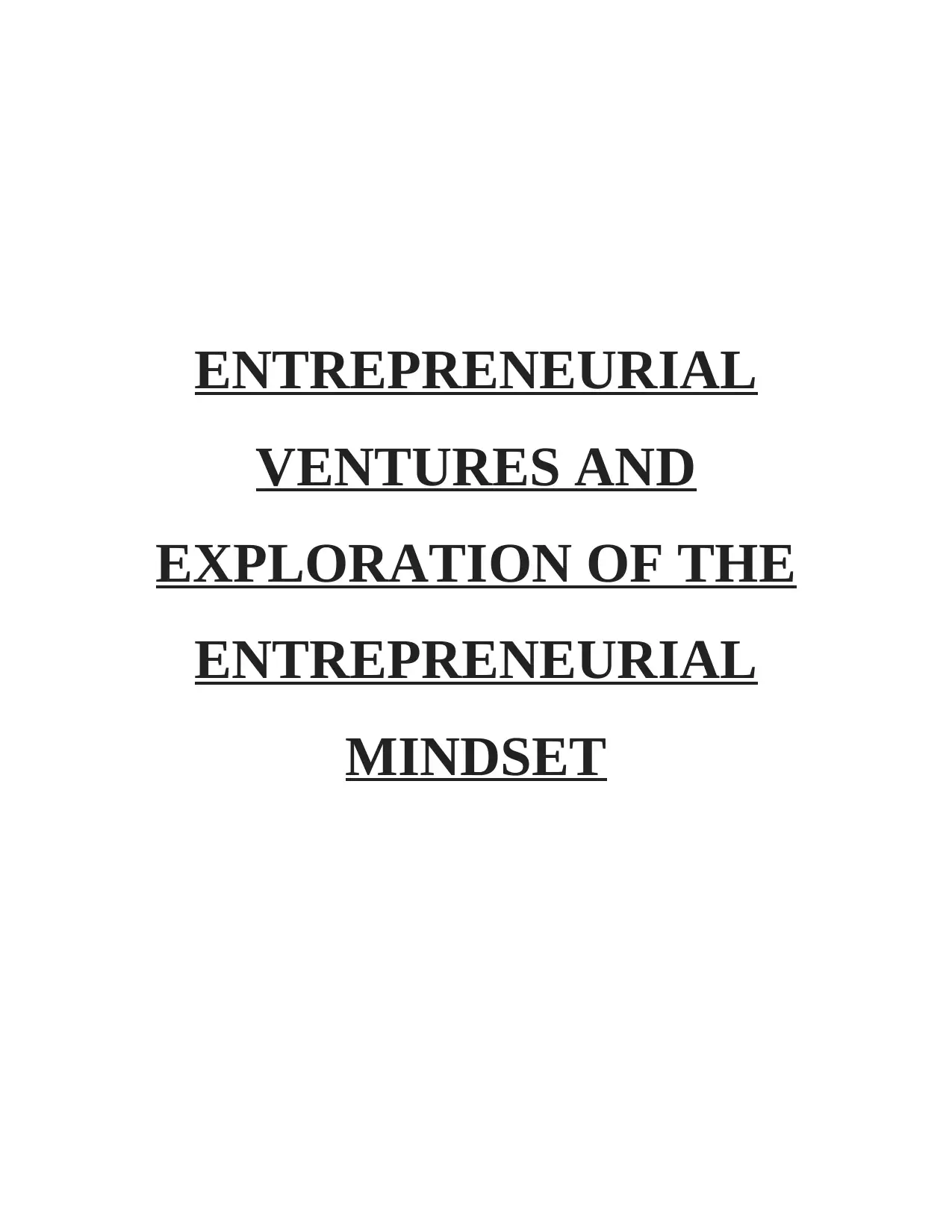
ENTREPRENEURIAL
VENTURES AND
EXPLORATION OF THE
ENTREPRENEURIAL
MINDSET
VENTURES AND
EXPLORATION OF THE
ENTREPRENEURIAL
MINDSET
Paraphrase This Document
Need a fresh take? Get an instant paraphrase of this document with our AI Paraphraser

Table of Contents
INTRODUCTION...........................................................................................................................................3
PART 1.........................................................................................................................................................3
Various types of entrepreneurial ventures and they are related to typology of entrepreneurship.............3
Differences and Similarities between entrepreneurial ventures...............................................................4
Interpretation of relevant statistics and data to illustrate small and micro business impact on the
economy..................................................................................................................................................7
Evaluate the importance of small businesses and business start-ups in the growth of the social economy
.................................................................................................................................................................9
PART 2.......................................................................................................................................................10
Determine the skills and characteristic traits of successful entrepreneurs that make them different from
other business managers........................................................................................................................10
Assessment of aspects of entrepreneurial personality reflects entrepreneurial mindset and motivation.11
Experience and background can foster and hinder entrepreneurship by using relevant examples.........12
CONCLUSION.............................................................................................................................................14
REFERENCES..............................................................................................................................................15
INTRODUCTION...........................................................................................................................................3
PART 1.........................................................................................................................................................3
Various types of entrepreneurial ventures and they are related to typology of entrepreneurship.............3
Differences and Similarities between entrepreneurial ventures...............................................................4
Interpretation of relevant statistics and data to illustrate small and micro business impact on the
economy..................................................................................................................................................7
Evaluate the importance of small businesses and business start-ups in the growth of the social economy
.................................................................................................................................................................9
PART 2.......................................................................................................................................................10
Determine the skills and characteristic traits of successful entrepreneurs that make them different from
other business managers........................................................................................................................10
Assessment of aspects of entrepreneurial personality reflects entrepreneurial mindset and motivation.11
Experience and background can foster and hinder entrepreneurship by using relevant examples.........12
CONCLUSION.............................................................................................................................................14
REFERENCES..............................................................................................................................................15
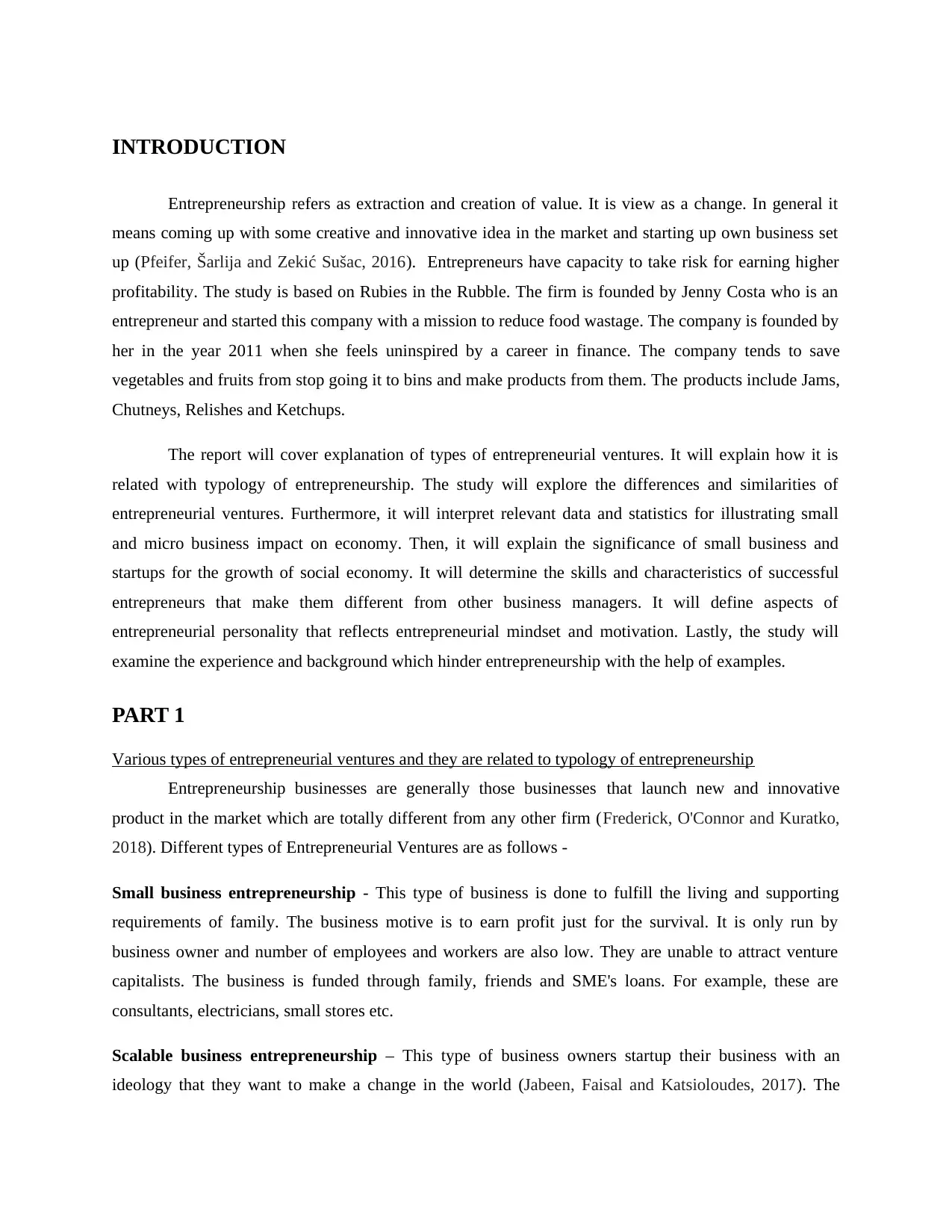
INTRODUCTION
Entrepreneurship refers as extraction and creation of value. It is view as a change. In general it
means coming up with some creative and innovative idea in the market and starting up own business set
up (Pfeifer, Šarlija and Zekić Sušac, 2016). Entrepreneurs have capacity to take risk for earning higher
profitability. The study is based on Rubies in the Rubble. The firm is founded by Jenny Costa who is an
entrepreneur and started this company with a mission to reduce food wastage. The company is founded by
her in the year 2011 when she feels uninspired by a career in finance. The company tends to save
vegetables and fruits from stop going it to bins and make products from them. The products include Jams,
Chutneys, Relishes and Ketchups.
The report will cover explanation of types of entrepreneurial ventures. It will explain how it is
related with typology of entrepreneurship. The study will explore the differences and similarities of
entrepreneurial ventures. Furthermore, it will interpret relevant data and statistics for illustrating small
and micro business impact on economy. Then, it will explain the significance of small business and
startups for the growth of social economy. It will determine the skills and characteristics of successful
entrepreneurs that make them different from other business managers. It will define aspects of
entrepreneurial personality that reflects entrepreneurial mindset and motivation. Lastly, the study will
examine the experience and background which hinder entrepreneurship with the help of examples.
PART 1
Various types of entrepreneurial ventures and they are related to typology of entrepreneurship
Entrepreneurship businesses are generally those businesses that launch new and innovative
product in the market which are totally different from any other firm (Frederick, O'Connor and Kuratko,
2018). Different types of Entrepreneurial Ventures are as follows -
Small business entrepreneurship - This type of business is done to fulfill the living and supporting
requirements of family. The business motive is to earn profit just for the survival. It is only run by
business owner and number of employees and workers are also low. They are unable to attract venture
capitalists. The business is funded through family, friends and SME's loans. For example, these are
consultants, electricians, small stores etc.
Scalable business entrepreneurship – This type of business owners startup their business with an
ideology that they want to make a change in the world (Jabeen, Faisal and Katsioloudes, 2017). The
Entrepreneurship refers as extraction and creation of value. It is view as a change. In general it
means coming up with some creative and innovative idea in the market and starting up own business set
up (Pfeifer, Šarlija and Zekić Sušac, 2016). Entrepreneurs have capacity to take risk for earning higher
profitability. The study is based on Rubies in the Rubble. The firm is founded by Jenny Costa who is an
entrepreneur and started this company with a mission to reduce food wastage. The company is founded by
her in the year 2011 when she feels uninspired by a career in finance. The company tends to save
vegetables and fruits from stop going it to bins and make products from them. The products include Jams,
Chutneys, Relishes and Ketchups.
The report will cover explanation of types of entrepreneurial ventures. It will explain how it is
related with typology of entrepreneurship. The study will explore the differences and similarities of
entrepreneurial ventures. Furthermore, it will interpret relevant data and statistics for illustrating small
and micro business impact on economy. Then, it will explain the significance of small business and
startups for the growth of social economy. It will determine the skills and characteristics of successful
entrepreneurs that make them different from other business managers. It will define aspects of
entrepreneurial personality that reflects entrepreneurial mindset and motivation. Lastly, the study will
examine the experience and background which hinder entrepreneurship with the help of examples.
PART 1
Various types of entrepreneurial ventures and they are related to typology of entrepreneurship
Entrepreneurship businesses are generally those businesses that launch new and innovative
product in the market which are totally different from any other firm (Frederick, O'Connor and Kuratko,
2018). Different types of Entrepreneurial Ventures are as follows -
Small business entrepreneurship - This type of business is done to fulfill the living and supporting
requirements of family. The business motive is to earn profit just for the survival. It is only run by
business owner and number of employees and workers are also low. They are unable to attract venture
capitalists. The business is funded through family, friends and SME's loans. For example, these are
consultants, electricians, small stores etc.
Scalable business entrepreneurship – This type of business owners startup their business with an
ideology that they want to make a change in the world (Jabeen, Faisal and Katsioloudes, 2017). The
⊘ This is a preview!⊘
Do you want full access?
Subscribe today to unlock all pages.

Trusted by 1+ million students worldwide
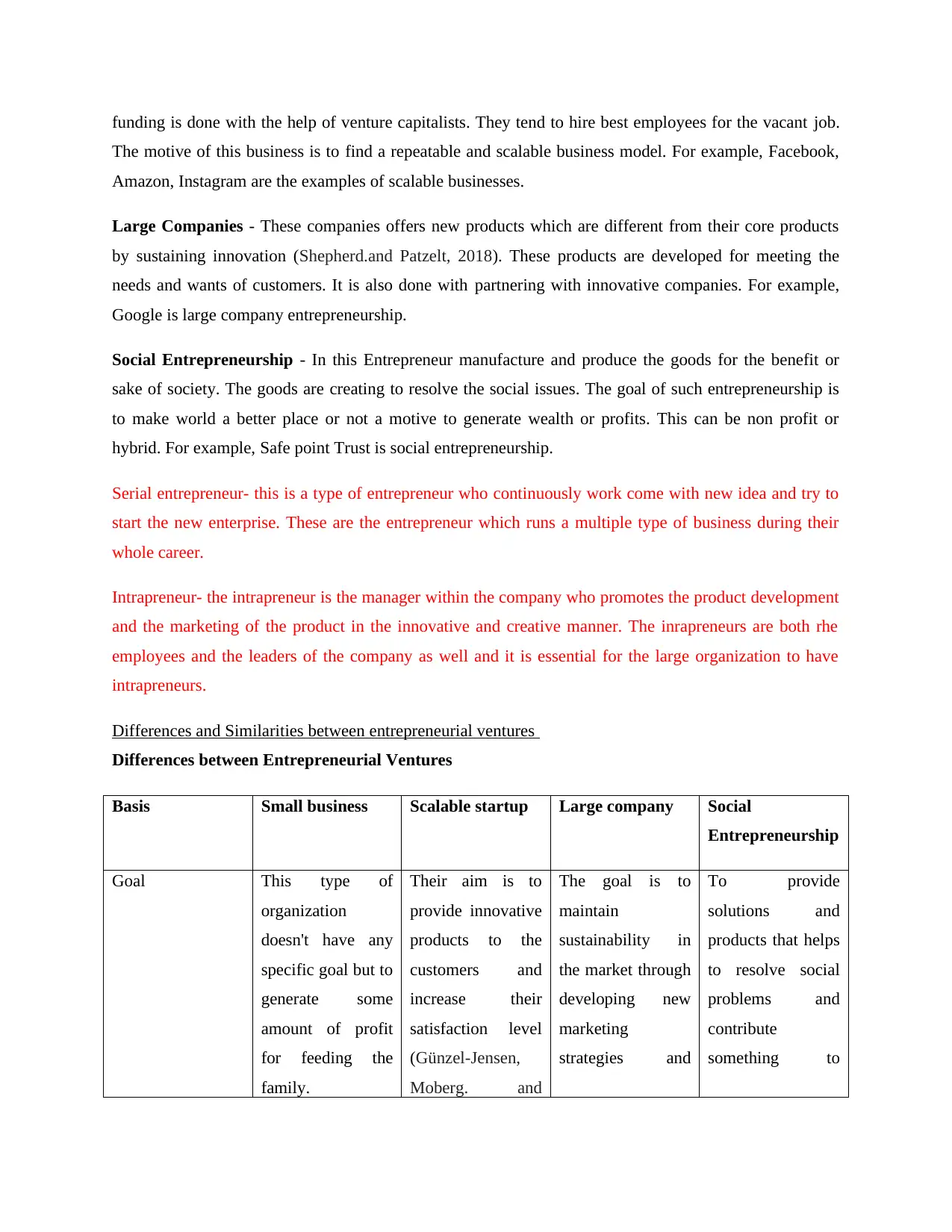
funding is done with the help of venture capitalists. They tend to hire best employees for the vacant job.
The motive of this business is to find a repeatable and scalable business model. For example, Facebook,
Amazon, Instagram are the examples of scalable businesses.
Large Companies - These companies offers new products which are different from their core products
by sustaining innovation (Shepherd.and Patzelt, 2018). These products are developed for meeting the
needs and wants of customers. It is also done with partnering with innovative companies. For example,
Google is large company entrepreneurship.
Social Entrepreneurship - In this Entrepreneur manufacture and produce the goods for the benefit or
sake of society. The goods are creating to resolve the social issues. The goal of such entrepreneurship is
to make world a better place or not a motive to generate wealth or profits. This can be non profit or
hybrid. For example, Safe point Trust is social entrepreneurship.
Serial entrepreneur- this is a type of entrepreneur who continuously work come with new idea and try to
start the new enterprise. These are the entrepreneur which runs a multiple type of business during their
whole career.
Intrapreneur- the intrapreneur is the manager within the company who promotes the product development
and the marketing of the product in the innovative and creative manner. The inrapreneurs are both rhe
employees and the leaders of the company as well and it is essential for the large organization to have
intrapreneurs.
Differences and Similarities between entrepreneurial ventures
Differences between Entrepreneurial Ventures
Basis Small business Scalable startup Large company Social
Entrepreneurship
Goal This type of
organization
doesn't have any
specific goal but to
generate some
amount of profit
for feeding the
family.
Their aim is to
provide innovative
products to the
customers and
increase their
satisfaction level
(Günzel-Jensen,
Moberg. and
The goal is to
maintain
sustainability in
the market through
developing new
marketing
strategies and
To provide
solutions and
products that helps
to resolve social
problems and
contribute
something to
The motive of this business is to find a repeatable and scalable business model. For example, Facebook,
Amazon, Instagram are the examples of scalable businesses.
Large Companies - These companies offers new products which are different from their core products
by sustaining innovation (Shepherd.and Patzelt, 2018). These products are developed for meeting the
needs and wants of customers. It is also done with partnering with innovative companies. For example,
Google is large company entrepreneurship.
Social Entrepreneurship - In this Entrepreneur manufacture and produce the goods for the benefit or
sake of society. The goods are creating to resolve the social issues. The goal of such entrepreneurship is
to make world a better place or not a motive to generate wealth or profits. This can be non profit or
hybrid. For example, Safe point Trust is social entrepreneurship.
Serial entrepreneur- this is a type of entrepreneur who continuously work come with new idea and try to
start the new enterprise. These are the entrepreneur which runs a multiple type of business during their
whole career.
Intrapreneur- the intrapreneur is the manager within the company who promotes the product development
and the marketing of the product in the innovative and creative manner. The inrapreneurs are both rhe
employees and the leaders of the company as well and it is essential for the large organization to have
intrapreneurs.
Differences and Similarities between entrepreneurial ventures
Differences between Entrepreneurial Ventures
Basis Small business Scalable startup Large company Social
Entrepreneurship
Goal This type of
organization
doesn't have any
specific goal but to
generate some
amount of profit
for feeding the
family.
Their aim is to
provide innovative
products to the
customers and
increase their
satisfaction level
(Günzel-Jensen,
Moberg. and
The goal is to
maintain
sustainability in
the market through
developing new
marketing
strategies and
To provide
solutions and
products that helps
to resolve social
problems and
contribute
something to
Paraphrase This Document
Need a fresh take? Get an instant paraphrase of this document with our AI Paraphraser
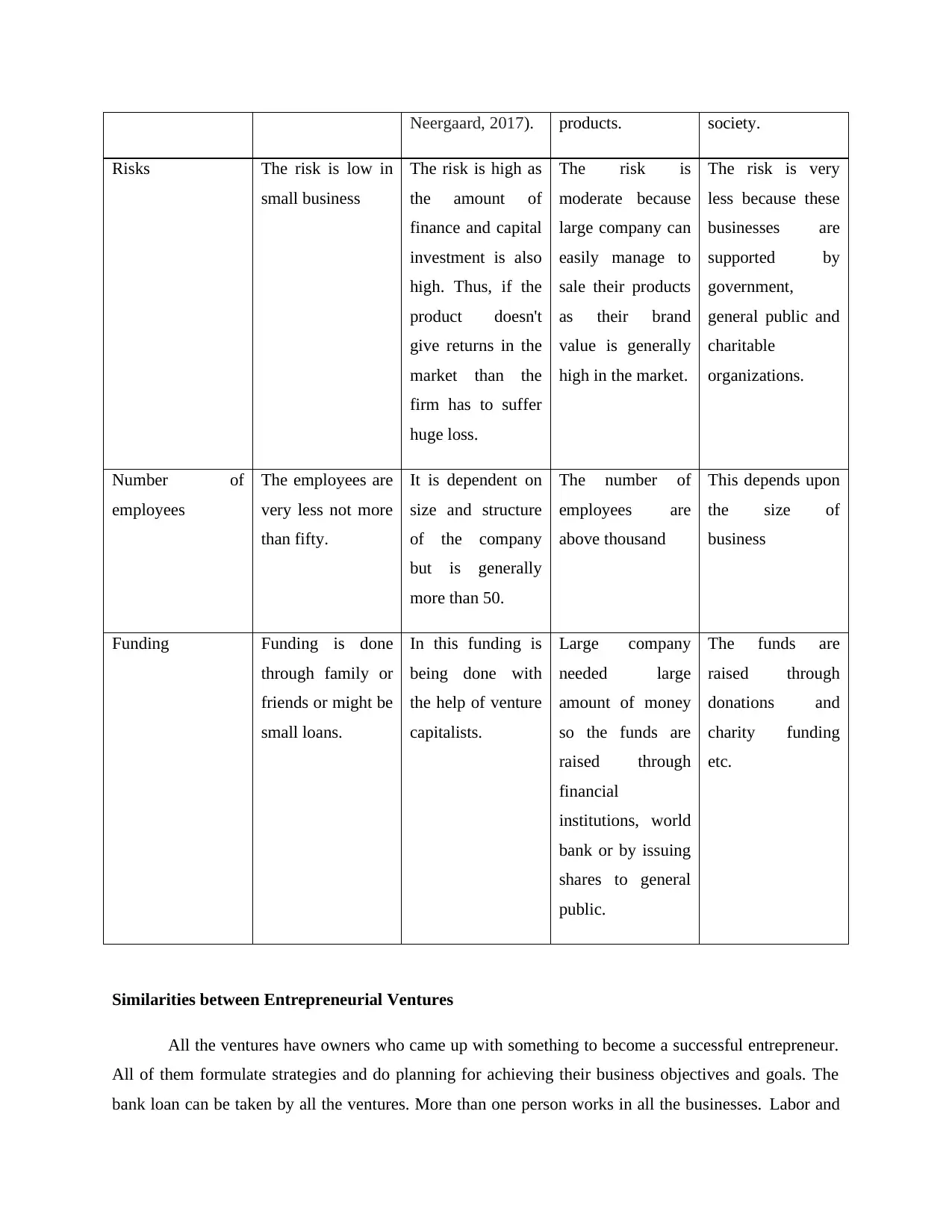
Neergaard, 2017). products. society.
Risks The risk is low in
small business
The risk is high as
the amount of
finance and capital
investment is also
high. Thus, if the
product doesn't
give returns in the
market than the
firm has to suffer
huge loss.
The risk is
moderate because
large company can
easily manage to
sale their products
as their brand
value is generally
high in the market.
The risk is very
less because these
businesses are
supported by
government,
general public and
charitable
organizations.
Number of
employees
The employees are
very less not more
than fifty.
It is dependent on
size and structure
of the company
but is generally
more than 50.
The number of
employees are
above thousand
This depends upon
the size of
business
Funding Funding is done
through family or
friends or might be
small loans.
In this funding is
being done with
the help of venture
capitalists.
Large company
needed large
amount of money
so the funds are
raised through
financial
institutions, world
bank or by issuing
shares to general
public.
The funds are
raised through
donations and
charity funding
etc.
Similarities between Entrepreneurial Ventures
All the ventures have owners who came up with something to become a successful entrepreneur.
All of them formulate strategies and do planning for achieving their business objectives and goals. The
bank loan can be taken by all the ventures. More than one person works in all the businesses. Labor and
Risks The risk is low in
small business
The risk is high as
the amount of
finance and capital
investment is also
high. Thus, if the
product doesn't
give returns in the
market than the
firm has to suffer
huge loss.
The risk is
moderate because
large company can
easily manage to
sale their products
as their brand
value is generally
high in the market.
The risk is very
less because these
businesses are
supported by
government,
general public and
charitable
organizations.
Number of
employees
The employees are
very less not more
than fifty.
It is dependent on
size and structure
of the company
but is generally
more than 50.
The number of
employees are
above thousand
This depends upon
the size of
business
Funding Funding is done
through family or
friends or might be
small loans.
In this funding is
being done with
the help of venture
capitalists.
Large company
needed large
amount of money
so the funds are
raised through
financial
institutions, world
bank or by issuing
shares to general
public.
The funds are
raised through
donations and
charity funding
etc.
Similarities between Entrepreneurial Ventures
All the ventures have owners who came up with something to become a successful entrepreneur.
All of them formulate strategies and do planning for achieving their business objectives and goals. The
bank loan can be taken by all the ventures. More than one person works in all the businesses. Labor and

workers are needed for the entrepreneurial ventures. Everyone wants to a successful brand in the market
and wants to recognize as the entrepreneur and also wants to become an inspiring personality (Naumann,
2017). Entrepreneurial typologies is the term which is used to describe the various classifications of the
various types of entrepreneurs regardless of some common basis.
and wants to recognize as the entrepreneur and also wants to become an inspiring personality (Naumann,
2017). Entrepreneurial typologies is the term which is used to describe the various classifications of the
various types of entrepreneurs regardless of some common basis.
⊘ This is a preview!⊘
Do you want full access?
Subscribe today to unlock all pages.

Trusted by 1+ million students worldwide
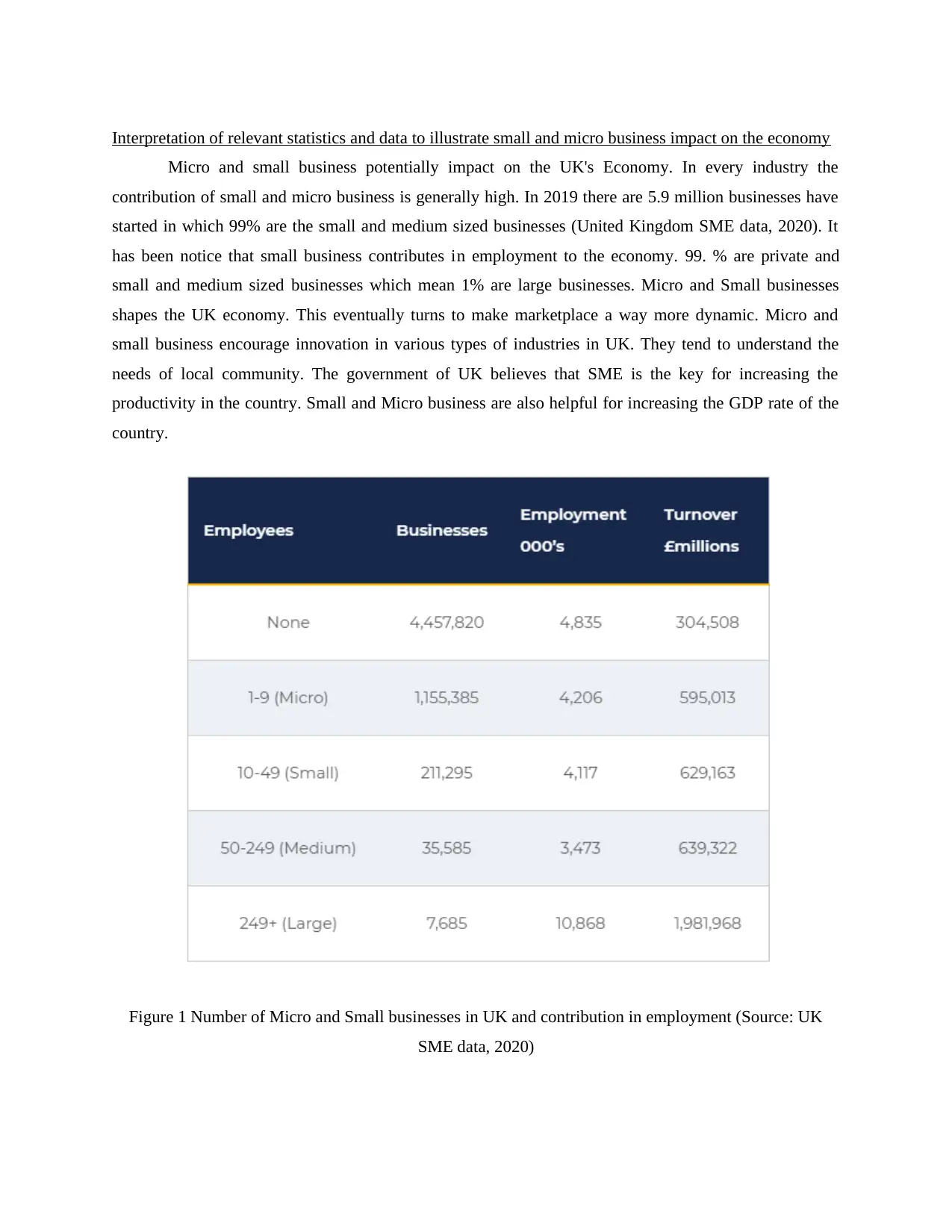
Interpretation of relevant statistics and data to illustrate small and micro business impact on the economy
Micro and small business potentially impact on the UK's Economy. In every industry the
contribution of small and micro business is generally high. In 2019 there are 5.9 million businesses have
started in which 99% are the small and medium sized businesses (United Kingdom SME data, 2020). It
has been notice that small business contributes in employment to the economy. 99. % are private and
small and medium sized businesses which mean 1% are large businesses. Micro and Small businesses
shapes the UK economy. This eventually turns to make marketplace a way more dynamic. Micro and
small business encourage innovation in various types of industries in UK. They tend to understand the
needs of local community. The government of UK believes that SME is the key for increasing the
productivity in the country. Small and Micro business are also helpful for increasing the GDP rate of the
country.
Figure 1 Number of Micro and Small businesses in UK and contribution in employment (Source: UK
SME data, 2020)
Micro and small business potentially impact on the UK's Economy. In every industry the
contribution of small and micro business is generally high. In 2019 there are 5.9 million businesses have
started in which 99% are the small and medium sized businesses (United Kingdom SME data, 2020). It
has been notice that small business contributes in employment to the economy. 99. % are private and
small and medium sized businesses which mean 1% are large businesses. Micro and Small businesses
shapes the UK economy. This eventually turns to make marketplace a way more dynamic. Micro and
small business encourage innovation in various types of industries in UK. They tend to understand the
needs of local community. The government of UK believes that SME is the key for increasing the
productivity in the country. Small and Micro business are also helpful for increasing the GDP rate of the
country.
Figure 1 Number of Micro and Small businesses in UK and contribution in employment (Source: UK
SME data, 2020)
Paraphrase This Document
Need a fresh take? Get an instant paraphrase of this document with our AI Paraphraser
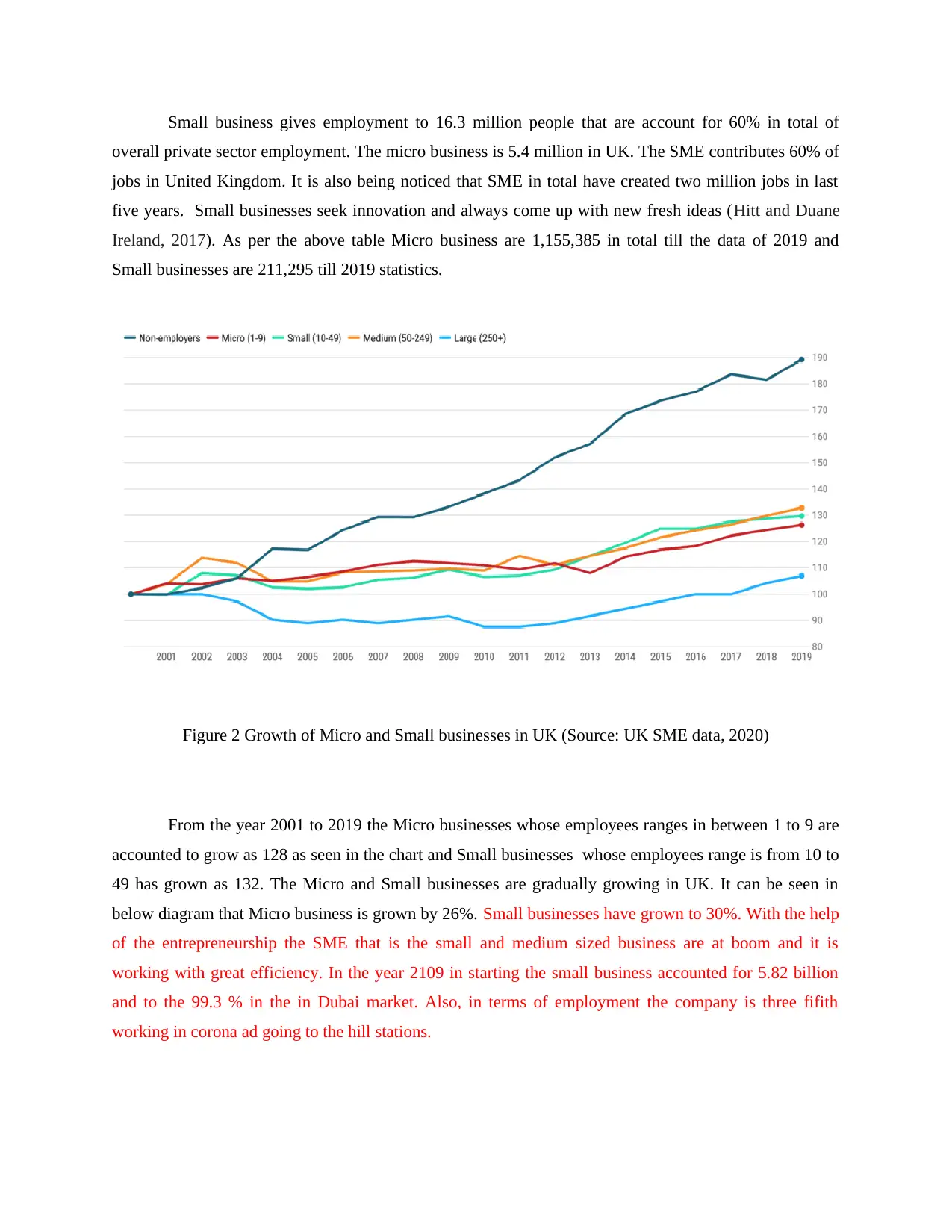
Small business gives employment to 16.3 million people that are account for 60% in total of
overall private sector employment. The micro business is 5.4 million in UK. The SME contributes 60% of
jobs in United Kingdom. It is also being noticed that SME in total have created two million jobs in last
five years. Small businesses seek innovation and always come up with new fresh ideas (Hitt and Duane
Ireland, 2017). As per the above table Micro business are 1,155,385 in total till the data of 2019 and
Small businesses are 211,295 till 2019 statistics.
Figure 2 Growth of Micro and Small businesses in UK (Source: UK SME data, 2020)
From the year 2001 to 2019 the Micro businesses whose employees ranges in between 1 to 9 are
accounted to grow as 128 as seen in the chart and Small businesses whose employees range is from 10 to
49 has grown as 132. The Micro and Small businesses are gradually growing in UK. It can be seen in
below diagram that Micro business is grown by 26%. Small businesses have grown to 30%. With the help
of the entrepreneurship the SME that is the small and medium sized business are at boom and it is
working with great efficiency. In the year 2109 in starting the small business accounted for 5.82 billion
and to the 99.3 % in the in Dubai market. Also, in terms of employment the company is three fifith
working in corona ad going to the hill stations.
overall private sector employment. The micro business is 5.4 million in UK. The SME contributes 60% of
jobs in United Kingdom. It is also being noticed that SME in total have created two million jobs in last
five years. Small businesses seek innovation and always come up with new fresh ideas (Hitt and Duane
Ireland, 2017). As per the above table Micro business are 1,155,385 in total till the data of 2019 and
Small businesses are 211,295 till 2019 statistics.
Figure 2 Growth of Micro and Small businesses in UK (Source: UK SME data, 2020)
From the year 2001 to 2019 the Micro businesses whose employees ranges in between 1 to 9 are
accounted to grow as 128 as seen in the chart and Small businesses whose employees range is from 10 to
49 has grown as 132. The Micro and Small businesses are gradually growing in UK. It can be seen in
below diagram that Micro business is grown by 26%. Small businesses have grown to 30%. With the help
of the entrepreneurship the SME that is the small and medium sized business are at boom and it is
working with great efficiency. In the year 2109 in starting the small business accounted for 5.82 billion
and to the 99.3 % in the in Dubai market. Also, in terms of employment the company is three fifith
working in corona ad going to the hill stations.
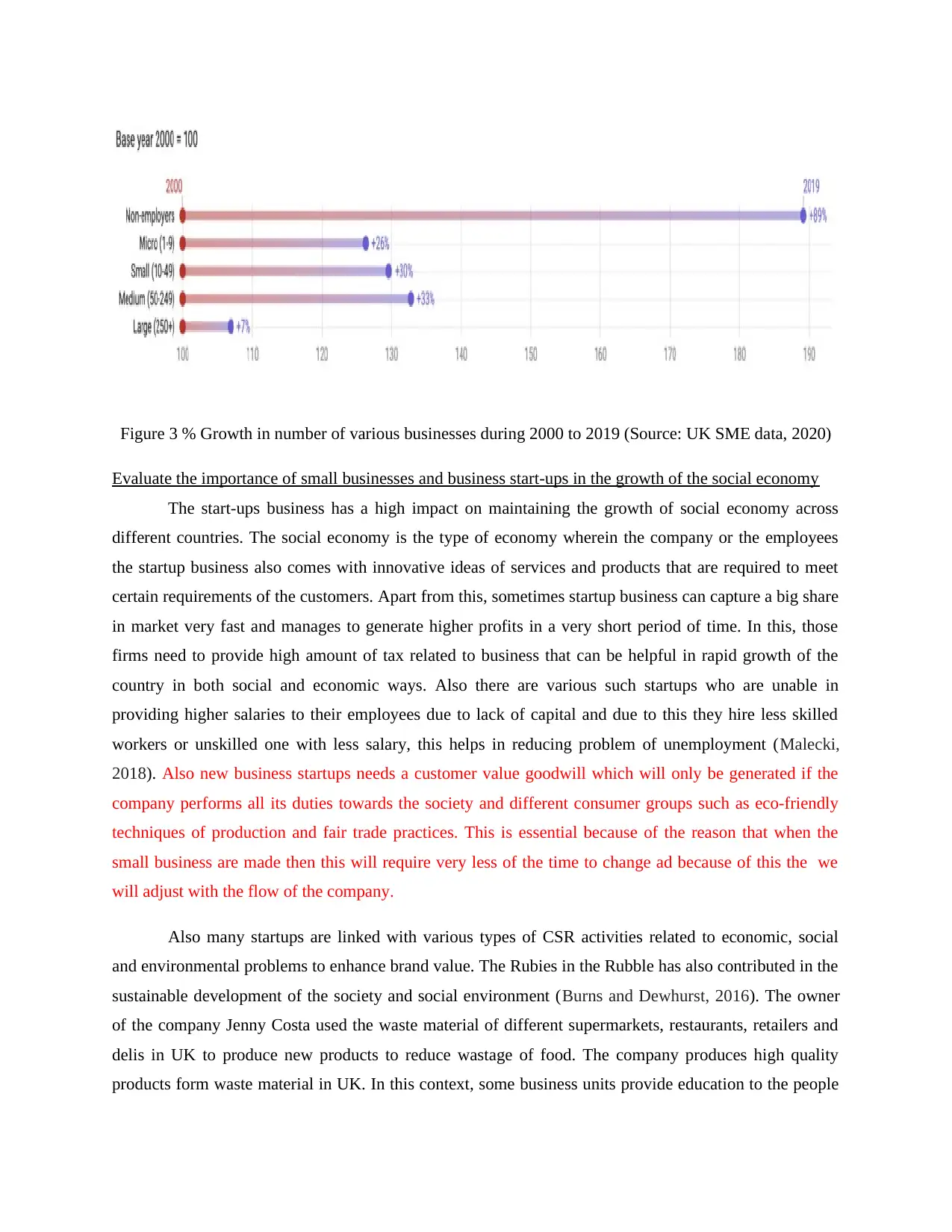
Figure 3 % Growth in number of various businesses during 2000 to 2019 (Source: UK SME data, 2020)
Evaluate the importance of small businesses and business start-ups in the growth of the social economy
The start-ups business has a high impact on maintaining the growth of social economy across
different countries. The social economy is the type of economy wherein the company or the employees
the startup business also comes with innovative ideas of services and products that are required to meet
certain requirements of the customers. Apart from this, sometimes startup business can capture a big share
in market very fast and manages to generate higher profits in a very short period of time. In this, those
firms need to provide high amount of tax related to business that can be helpful in rapid growth of the
country in both social and economic ways. Also there are various such startups who are unable in
providing higher salaries to their employees due to lack of capital and due to this they hire less skilled
workers or unskilled one with less salary, this helps in reducing problem of unemployment (Malecki,
2018). Also new business startups needs a customer value goodwill which will only be generated if the
company performs all its duties towards the society and different consumer groups such as eco-friendly
techniques of production and fair trade practices. This is essential because of the reason that when the
small business are made then this will require very less of the time to change ad because of this the we
will adjust with the flow of the company.
Also many startups are linked with various types of CSR activities related to economic, social
and environmental problems to enhance brand value. The Rubies in the Rubble has also contributed in the
sustainable development of the society and social environment (Burns and Dewhurst, 2016). The owner
of the company Jenny Costa used the waste material of different supermarkets, restaurants, retailers and
delis in UK to produce new products to reduce wastage of food. The company produces high quality
products form waste material in UK. In this context, some business units provide education to the people
Evaluate the importance of small businesses and business start-ups in the growth of the social economy
The start-ups business has a high impact on maintaining the growth of social economy across
different countries. The social economy is the type of economy wherein the company or the employees
the startup business also comes with innovative ideas of services and products that are required to meet
certain requirements of the customers. Apart from this, sometimes startup business can capture a big share
in market very fast and manages to generate higher profits in a very short period of time. In this, those
firms need to provide high amount of tax related to business that can be helpful in rapid growth of the
country in both social and economic ways. Also there are various such startups who are unable in
providing higher salaries to their employees due to lack of capital and due to this they hire less skilled
workers or unskilled one with less salary, this helps in reducing problem of unemployment (Malecki,
2018). Also new business startups needs a customer value goodwill which will only be generated if the
company performs all its duties towards the society and different consumer groups such as eco-friendly
techniques of production and fair trade practices. This is essential because of the reason that when the
small business are made then this will require very less of the time to change ad because of this the we
will adjust with the flow of the company.
Also many startups are linked with various types of CSR activities related to economic, social
and environmental problems to enhance brand value. The Rubies in the Rubble has also contributed in the
sustainable development of the society and social environment (Burns and Dewhurst, 2016). The owner
of the company Jenny Costa used the waste material of different supermarkets, restaurants, retailers and
delis in UK to produce new products to reduce wastage of food. The company produces high quality
products form waste material in UK. In this context, some business units provide education to the people
⊘ This is a preview!⊘
Do you want full access?
Subscribe today to unlock all pages.

Trusted by 1+ million students worldwide

in rural areas or people who are not financially capable. However, start up businesses face too many
problems to start their business due to lack of initial capital and also some other social, political and legal
factors. Also the new business startup helps in reducing amount of crime by engaging a large number of
young people in the business as it provides them a source of income. On the other side, social economy of
a country consists of different types of companies such as non-profit organizations, charity-based
organizations and cooperative organizations, etc.
In addition to this another major important of using SME in the business environment is the
creation of employment. This is a important because of the fact that this will increase the working people
and this creates more of the employment within the country. Another major importance of SME is that
this improves for the local market and this is majorly because of the reason that SME works in the local
market only as they do not have much investment and this increases the local market.
PART 2
Determine the skills and characteristic traits of successful entrepreneurs that make them different from
other business managers
Different skills and characteristic traits are important for the entrepreneurs to start a new business
successfully and enhance its growth (Storey, 2016). In order to setup a business, a fixed procedure must
be followed by the entrepreneur for successfully business startup. The personal characteristics that
entrepreneur requires are as following -
They need ability to generate new ideas.
Courage to take risks.
There should be clear vision and goals (Ndou, Secundo and Passiante, 2018).
Motivation is essential to achieve the goal.
The entrepreneur must have good management skills related to finance and human resource.
The personal skills of entrepreneur are as following -
Communication skill is essential to interact with various people such as suppliers, clients,
distributors and employees, etc.
The leadership skill is essential to show right path to employees for achieving goals ( Kuratko,
2016).
Negotiation skill is also important to deal with clients and also to mitigate any internal issues.
problems to start their business due to lack of initial capital and also some other social, political and legal
factors. Also the new business startup helps in reducing amount of crime by engaging a large number of
young people in the business as it provides them a source of income. On the other side, social economy of
a country consists of different types of companies such as non-profit organizations, charity-based
organizations and cooperative organizations, etc.
In addition to this another major important of using SME in the business environment is the
creation of employment. This is a important because of the fact that this will increase the working people
and this creates more of the employment within the country. Another major importance of SME is that
this improves for the local market and this is majorly because of the reason that SME works in the local
market only as they do not have much investment and this increases the local market.
PART 2
Determine the skills and characteristic traits of successful entrepreneurs that make them different from
other business managers
Different skills and characteristic traits are important for the entrepreneurs to start a new business
successfully and enhance its growth (Storey, 2016). In order to setup a business, a fixed procedure must
be followed by the entrepreneur for successfully business startup. The personal characteristics that
entrepreneur requires are as following -
They need ability to generate new ideas.
Courage to take risks.
There should be clear vision and goals (Ndou, Secundo and Passiante, 2018).
Motivation is essential to achieve the goal.
The entrepreneur must have good management skills related to finance and human resource.
The personal skills of entrepreneur are as following -
Communication skill is essential to interact with various people such as suppliers, clients,
distributors and employees, etc.
The leadership skill is essential to show right path to employees for achieving goals ( Kuratko,
2016).
Negotiation skill is also important to deal with clients and also to mitigate any internal issues.
Paraphrase This Document
Need a fresh take? Get an instant paraphrase of this document with our AI Paraphraser
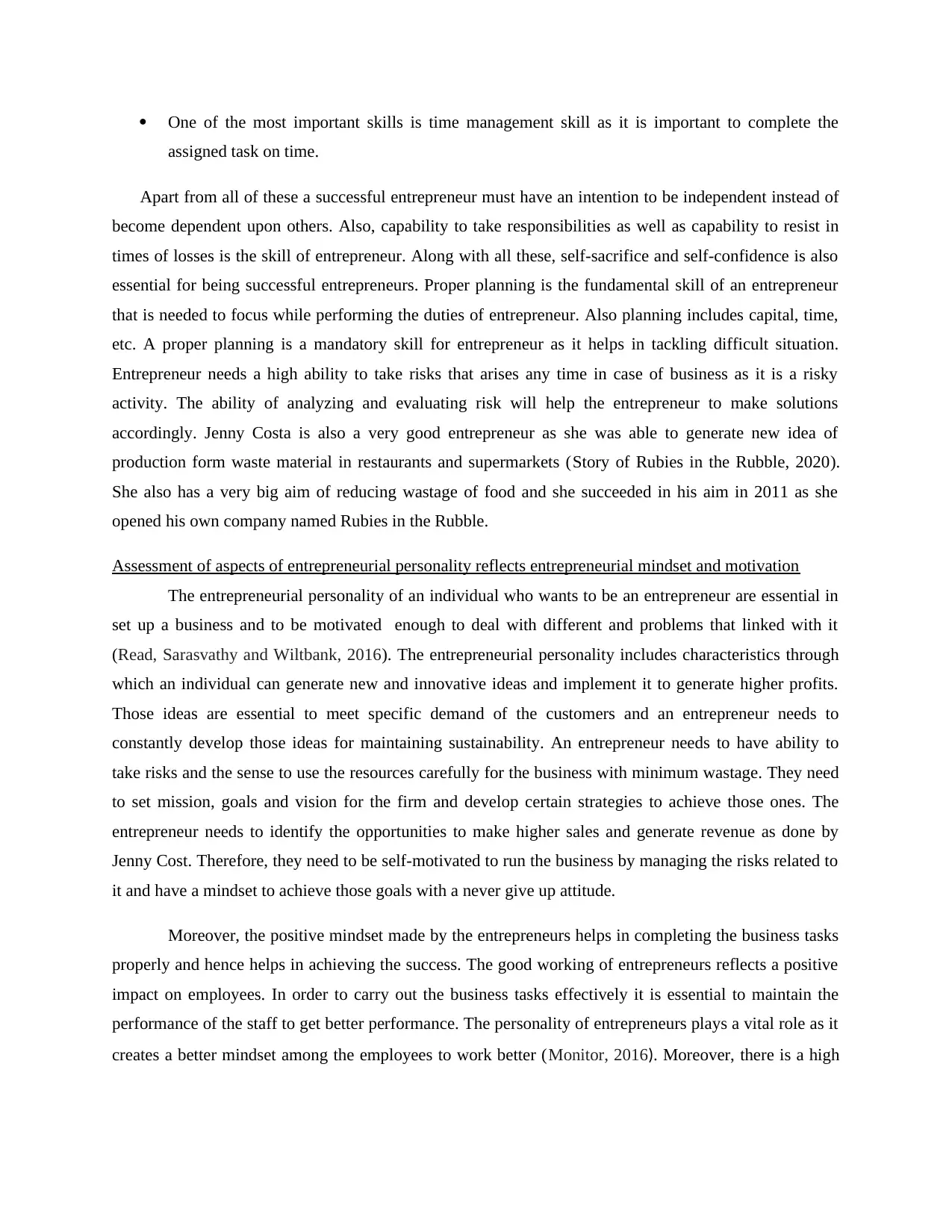
One of the most important skills is time management skill as it is important to complete the
assigned task on time.
Apart from all of these a successful entrepreneur must have an intention to be independent instead of
become dependent upon others. Also, capability to take responsibilities as well as capability to resist in
times of losses is the skill of entrepreneur. Along with all these, self-sacrifice and self-confidence is also
essential for being successful entrepreneurs. Proper planning is the fundamental skill of an entrepreneur
that is needed to focus while performing the duties of entrepreneur. Also planning includes capital, time,
etc. A proper planning is a mandatory skill for entrepreneur as it helps in tackling difficult situation.
Entrepreneur needs a high ability to take risks that arises any time in case of business as it is a risky
activity. The ability of analyzing and evaluating risk will help the entrepreneur to make solutions
accordingly. Jenny Costa is also a very good entrepreneur as she was able to generate new idea of
production form waste material in restaurants and supermarkets (Story of Rubies in the Rubble, 2020).
She also has a very big aim of reducing wastage of food and she succeeded in his aim in 2011 as she
opened his own company named Rubies in the Rubble.
Assessment of aspects of entrepreneurial personality reflects entrepreneurial mindset and motivation
The entrepreneurial personality of an individual who wants to be an entrepreneur are essential in
set up a business and to be motivated enough to deal with different and problems that linked with it
(Read, Sarasvathy and Wiltbank, 2016). The entrepreneurial personality includes characteristics through
which an individual can generate new and innovative ideas and implement it to generate higher profits.
Those ideas are essential to meet specific demand of the customers and an entrepreneur needs to
constantly develop those ideas for maintaining sustainability. An entrepreneur needs to have ability to
take risks and the sense to use the resources carefully for the business with minimum wastage. They need
to set mission, goals and vision for the firm and develop certain strategies to achieve those ones. The
entrepreneur needs to identify the opportunities to make higher sales and generate revenue as done by
Jenny Cost. Therefore, they need to be self-motivated to run the business by managing the risks related to
it and have a mindset to achieve those goals with a never give up attitude.
Moreover, the positive mindset made by the entrepreneurs helps in completing the business tasks
properly and hence helps in achieving the success. The good working of entrepreneurs reflects a positive
impact on employees. In order to carry out the business tasks effectively it is essential to maintain the
performance of the staff to get better performance. The personality of entrepreneurs plays a vital role as it
creates a better mindset among the employees to work better (Monitor, 2016). Moreover, there is a high
assigned task on time.
Apart from all of these a successful entrepreneur must have an intention to be independent instead of
become dependent upon others. Also, capability to take responsibilities as well as capability to resist in
times of losses is the skill of entrepreneur. Along with all these, self-sacrifice and self-confidence is also
essential for being successful entrepreneurs. Proper planning is the fundamental skill of an entrepreneur
that is needed to focus while performing the duties of entrepreneur. Also planning includes capital, time,
etc. A proper planning is a mandatory skill for entrepreneur as it helps in tackling difficult situation.
Entrepreneur needs a high ability to take risks that arises any time in case of business as it is a risky
activity. The ability of analyzing and evaluating risk will help the entrepreneur to make solutions
accordingly. Jenny Costa is also a very good entrepreneur as she was able to generate new idea of
production form waste material in restaurants and supermarkets (Story of Rubies in the Rubble, 2020).
She also has a very big aim of reducing wastage of food and she succeeded in his aim in 2011 as she
opened his own company named Rubies in the Rubble.
Assessment of aspects of entrepreneurial personality reflects entrepreneurial mindset and motivation
The entrepreneurial personality of an individual who wants to be an entrepreneur are essential in
set up a business and to be motivated enough to deal with different and problems that linked with it
(Read, Sarasvathy and Wiltbank, 2016). The entrepreneurial personality includes characteristics through
which an individual can generate new and innovative ideas and implement it to generate higher profits.
Those ideas are essential to meet specific demand of the customers and an entrepreneur needs to
constantly develop those ideas for maintaining sustainability. An entrepreneur needs to have ability to
take risks and the sense to use the resources carefully for the business with minimum wastage. They need
to set mission, goals and vision for the firm and develop certain strategies to achieve those ones. The
entrepreneur needs to identify the opportunities to make higher sales and generate revenue as done by
Jenny Cost. Therefore, they need to be self-motivated to run the business by managing the risks related to
it and have a mindset to achieve those goals with a never give up attitude.
Moreover, the positive mindset made by the entrepreneurs helps in completing the business tasks
properly and hence helps in achieving the success. The good working of entrepreneurs reflects a positive
impact on employees. In order to carry out the business tasks effectively it is essential to maintain the
performance of the staff to get better performance. The personality of entrepreneurs plays a vital role as it
creates a better mindset among the employees to work better (Monitor, 2016). Moreover, there is a high
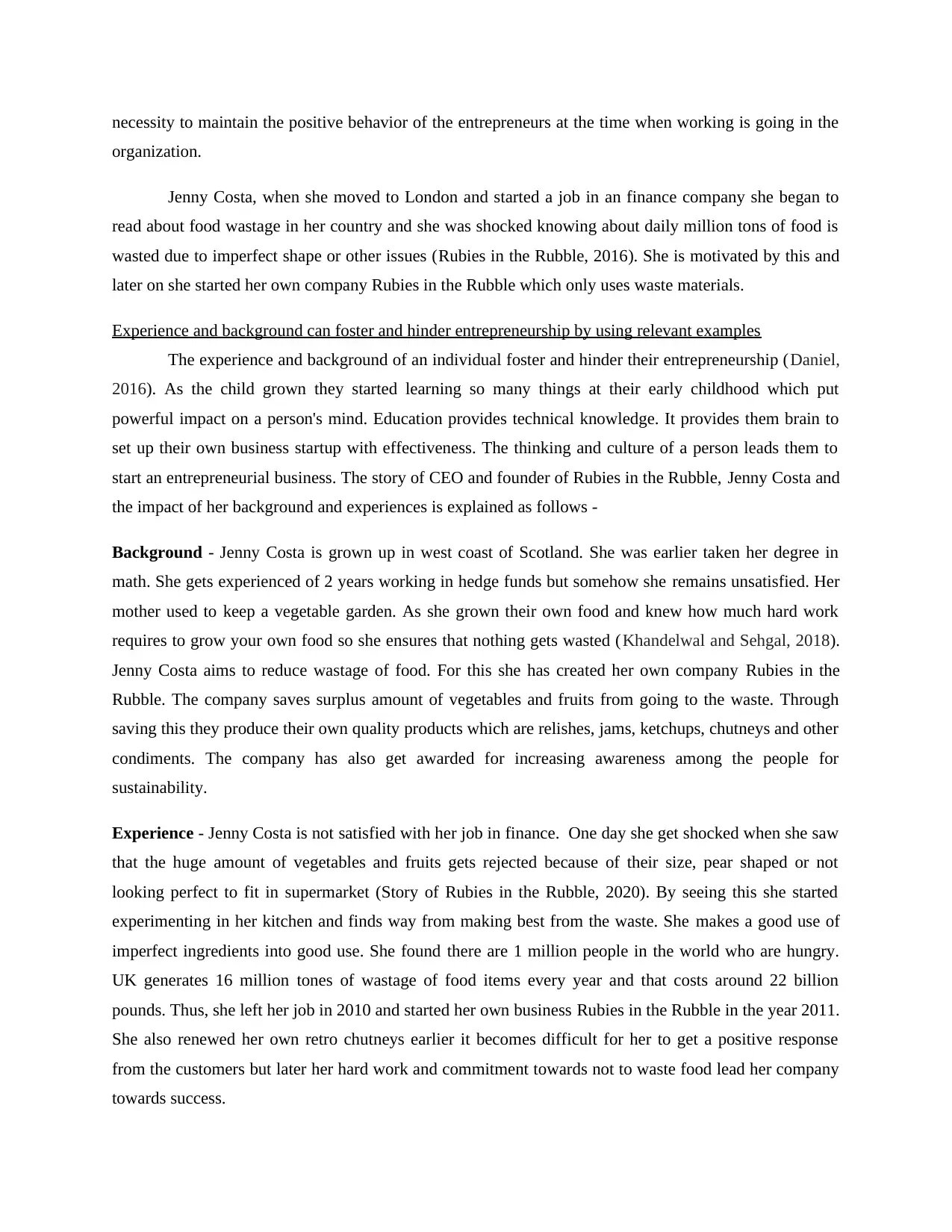
necessity to maintain the positive behavior of the entrepreneurs at the time when working is going in the
organization.
Jenny Costa, when she moved to London and started a job in an finance company she began to
read about food wastage in her country and she was shocked knowing about daily million tons of food is
wasted due to imperfect shape or other issues (Rubies in the Rubble, 2016). She is motivated by this and
later on she started her own company Rubies in the Rubble which only uses waste materials.
Experience and background can foster and hinder entrepreneurship by using relevant examples
The experience and background of an individual foster and hinder their entrepreneurship (Daniel,
2016). As the child grown they started learning so many things at their early childhood which put
powerful impact on a person's mind. Education provides technical knowledge. It provides them brain to
set up their own business startup with effectiveness. The thinking and culture of a person leads them to
start an entrepreneurial business. The story of CEO and founder of Rubies in the Rubble, Jenny Costa and
the impact of her background and experiences is explained as follows -
Background - Jenny Costa is grown up in west coast of Scotland. She was earlier taken her degree in
math. She gets experienced of 2 years working in hedge funds but somehow she remains unsatisfied. Her
mother used to keep a vegetable garden. As she grown their own food and knew how much hard work
requires to grow your own food so she ensures that nothing gets wasted (Khandelwal and Sehgal, 2018).
Jenny Costa aims to reduce wastage of food. For this she has created her own company Rubies in the
Rubble. The company saves surplus amount of vegetables and fruits from going to the waste. Through
saving this they produce their own quality products which are relishes, jams, ketchups, chutneys and other
condiments. The company has also get awarded for increasing awareness among the people for
sustainability.
Experience - Jenny Costa is not satisfied with her job in finance. One day she get shocked when she saw
that the huge amount of vegetables and fruits gets rejected because of their size, pear shaped or not
looking perfect to fit in supermarket (Story of Rubies in the Rubble, 2020). By seeing this she started
experimenting in her kitchen and finds way from making best from the waste. She makes a good use of
imperfect ingredients into good use. She found there are 1 million people in the world who are hungry.
UK generates 16 million tones of wastage of food items every year and that costs around 22 billion
pounds. Thus, she left her job in 2010 and started her own business Rubies in the Rubble in the year 2011.
She also renewed her own retro chutneys earlier it becomes difficult for her to get a positive response
from the customers but later her hard work and commitment towards not to waste food lead her company
towards success.
organization.
Jenny Costa, when she moved to London and started a job in an finance company she began to
read about food wastage in her country and she was shocked knowing about daily million tons of food is
wasted due to imperfect shape or other issues (Rubies in the Rubble, 2016). She is motivated by this and
later on she started her own company Rubies in the Rubble which only uses waste materials.
Experience and background can foster and hinder entrepreneurship by using relevant examples
The experience and background of an individual foster and hinder their entrepreneurship (Daniel,
2016). As the child grown they started learning so many things at their early childhood which put
powerful impact on a person's mind. Education provides technical knowledge. It provides them brain to
set up their own business startup with effectiveness. The thinking and culture of a person leads them to
start an entrepreneurial business. The story of CEO and founder of Rubies in the Rubble, Jenny Costa and
the impact of her background and experiences is explained as follows -
Background - Jenny Costa is grown up in west coast of Scotland. She was earlier taken her degree in
math. She gets experienced of 2 years working in hedge funds but somehow she remains unsatisfied. Her
mother used to keep a vegetable garden. As she grown their own food and knew how much hard work
requires to grow your own food so she ensures that nothing gets wasted (Khandelwal and Sehgal, 2018).
Jenny Costa aims to reduce wastage of food. For this she has created her own company Rubies in the
Rubble. The company saves surplus amount of vegetables and fruits from going to the waste. Through
saving this they produce their own quality products which are relishes, jams, ketchups, chutneys and other
condiments. The company has also get awarded for increasing awareness among the people for
sustainability.
Experience - Jenny Costa is not satisfied with her job in finance. One day she get shocked when she saw
that the huge amount of vegetables and fruits gets rejected because of their size, pear shaped or not
looking perfect to fit in supermarket (Story of Rubies in the Rubble, 2020). By seeing this she started
experimenting in her kitchen and finds way from making best from the waste. She makes a good use of
imperfect ingredients into good use. She found there are 1 million people in the world who are hungry.
UK generates 16 million tones of wastage of food items every year and that costs around 22 billion
pounds. Thus, she left her job in 2010 and started her own business Rubies in the Rubble in the year 2011.
She also renewed her own retro chutneys earlier it becomes difficult for her to get a positive response
from the customers but later her hard work and commitment towards not to waste food lead her company
towards success.
⊘ This is a preview!⊘
Do you want full access?
Subscribe today to unlock all pages.

Trusted by 1+ million students worldwide
1 out of 17
Related Documents
Your All-in-One AI-Powered Toolkit for Academic Success.
+13062052269
info@desklib.com
Available 24*7 on WhatsApp / Email
![[object Object]](/_next/static/media/star-bottom.7253800d.svg)
Unlock your academic potential
Copyright © 2020–2026 A2Z Services. All Rights Reserved. Developed and managed by ZUCOL.





